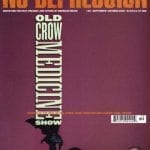The Black Keys – Modern Primitives
“Alfred McMoore has this weird sort of Tourette’s thing going on where he calls people he doesn’t like D Flats and Black Keys,” Carney relates. “I believe that these are things that he despises the sound of — D flats or any black key. It’s funny because, although I don’t know musical scales, I don’t think there’s a D flat [editor’s note: there is]. Anyhow, Alfred McMoore had been calling my dad every single day when I was talking to Dan about band names. I said, ‘Hey, what about the Black Keys?’ — and he instantly knew exactly what the fuck I was talking about, because Alfred McMoore called his dad’s house all the time too.”
Both Carney and Auerbach describe McMoore as nothing less than a genius. (For a further sign of their affection and respect, consider that the Black Keys publish their songs under the name of McMoore McLesst Music.) McMoore, who’s still alive and living in Akron, typically worked in pencil and crayon, producing stream-of-consciousness sketches on giant, four-foot-by-sixty-foot rolls of paper.
“You’d have things like funeral trains where Jesus would be playing an electric guitar that was plugged into a Christmas tree,” Auerbach remembers. “That’s the kind of shit that I was raised on — that’s high art to me, which kind of explains my idea about things like guitar playing. It was amazing to watch him do his artwork, because it was something that he taught himself to do. He had his own style and he was completely obsessive about it.”
It’s not lost on the guitarist that the same might be said about the Black Keys. By now, the band has both an established sonic aesthetic and an obsession with keeping everything in-house. That dictated how and where Auerbach and Carney recorded Magic Potion: at home. Not that they needed to; over the past couple of years, they’ve been lucky enough to have spent time in some of North America’s most fabled recording studios.
“We did a radio session for [Seattle’s] KEXP in Village Recorder, which was Steely Dan’s studio,” Carney says of one visit to Los Angeles. “While we were doing that, we also got to see the studio that Fleetwood Mac built for Tusk.”
Still, if Carney and Auerbach have learned anything from such experiences, it’s that they are happiest recording at home, which was the only place the Black Keys played during their early years. There weren’t even house parties — just the two of them refining their sound and recording methods through endless hours of experimentation.
“For the longest time all we wanted to do was have fun — we weren’t really concerned with playing live shows,” Auerbach says. “We liked to record, and that was it — to be in the basement with a four-track and hanging mikes from pipes. It was all about goofing around. Because of that, what we were doing came from a really honest place, and I think that helped us out from the get-go.”
If that period taught Auerbach and Carney anything, it was that nobody would ever understand the Black Keys better than they would.
“Dan and I are obsessed with cool studios,” Carney admits. “But I don’t think that I would ever want to make a Black Keys record in one of those places. I just like the whole aesthetic of making a record DIY and totally on our own. If Dan and I don’t have complete control over what we’re doing, we’re not going to do it. That’s why we do all of our records ourselves. I would never trust anyone else’s ears over his and mine.”
One of the benefits of working alone from the start was not having to please a producer. Pretty early on, the Black Keys convinced themselves there was no point striving for perfection with their recordings. Laughing, Carney suggests it took longer to make sure the mikes were in the right place than it did to record Magic Potion. Most songs were nailed in one or two takes, with the final track, a heavier-than-heaven stomper titled “Elevator”, taking what Carney calls “a borderline-excessive” five attempts.
“I’m a firm believer that when you record a record and put it out, that there’s always something that’s going to bug you for the rest of your life,” Carney says. “If I were to take out all of the things that bother me about Magic Potion, and Dan were to take out all the things that bother him, the record would probably sound pretty flat. You have to let certain mistakes and imperfections fly in order to make a good record.”
As much as Auerbach and Carney probably zero in on its flaws, Magic Potion is only going to add to the hype that’s been slowly building since Big Come Up. The Black Keys come out swinging: “Just Got To Be” serves up a strangled, spawn-of-Soundgarden guitar riff and devastingly simple drums. Scrape away the sixteen layers of six-string sludge, and you’ll find a golden pop song at the heart of the lumbering “Your Touch”, while “Elevator” plays things heavier than Black Flag during the slo-core years. Ironically, considering that the Keys were determined to keep things loud on Magic Potion, the album’s showstopper is its quietest track, a scarily gorgeous anti-ballad titled “You’re The One”. Elsewhere, the feedback-sprayed “Strange Desire” contains trace elements of stoner-rock, while “Just A Little Heat” will impress anyone with a taste for, dare we say it, dirt-bomb blues.




